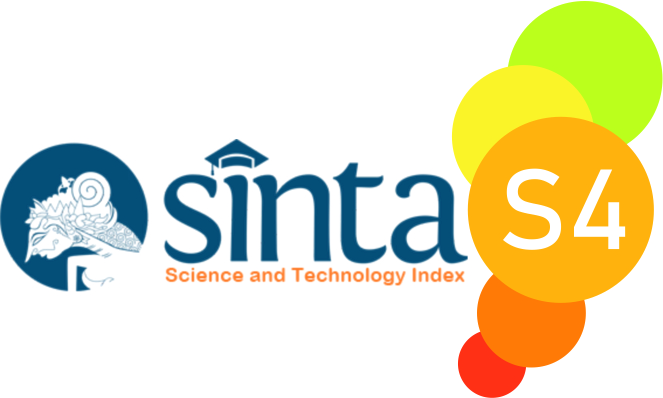Motivational Strategies in EFL Classes in Indonesia
Abstract
The current study is aimed at revealing the motivational strategies employed by EFL lecturers in two universities in Purwokerto, Central Java. This research falls into the qualitative category since it attempts to examine the data in the form of testimonies on how they motivated their students in their EFL classes. There were five EFL lecturers involved in this study and to collect the data, the researcher conducted semi-structured interview either offline or online. The collected data were then analyzed using thematic analysis. The results of the study show that the EFL lecturers employed four strategies namely using music, employing verbal motivation, building rapport with students, and hiring collaborative learning. Theoretically, the research can harness the knowledge on the motivational strategies in the Higher Education Institutions context especially in the Teaching of English as a Foreign Language. Practically, the results of the research may become alternative sources for teachers’ self-development.
References
Adams. (2015). Conducting_Semi-Structured_Interviews. https://www.researchgate.net/publication/301738442
Adara, R. A., & Taufik, M. (2020). ENHANCING EFL LEARNERS’ MOTIVATION THROUGH SONGS. IJEE (Indonesian Journal of English Education), 7(2), 189–200. https://doi.org/10.15408/ijee.v7i1.17321
Al Othman, F. H. M., & Shuqair, K. M. (2013). The Impact of Motivation on English Language Learning in the Gulf States. https://doi.org/10.5430/ijhe.v2n4p123
Alshehri, E., & Etherington, S. (2017). The Perception of EFL Teachers and Students in the Saudi Higher Education Context.
Brophy, J. (2010). Motivating Students to Learn. Routhledge.
Cheng, H.-F., & Dörnyei, Z. (2007). . The Use of Motivational Strategies in Language Instruction: The Case of EFL Teaching in Taiwan.
Cirocki, A., Soto, S. T., Encalada, M. A. R., & Cuenca, K. V. H. (2019). Motivational strategies in the secondary school EFL classroom: The case of Ecuador. Electronic Journal of Foreign Language Teaching, 16(2), 250–265. https://www.researchgate.net/publication/338281849_Motivational_Strategies_in_the_Secondary_School_EFL_Classroom_The_Case_of_Ecuador%0A
Dornyei, Z. (2001). Motivational Strategies in the Language Classrooms. Cambridge University Press.
Dörnyei, Z, & & Csizér, K. (1998). . . 1998. Ten commandments for motivating language learners: Results of an empirical study. https://doi.org/10.1177/1362168898
Dörnyei, Zoltán, & Csizér, K. (1998). Ten commandments for motivating language learners: Results of an empirical study. Language Teaching Research, 2(3), 203–229. https://doi.org/10.1177/136216889800200303
Eccles, J. S., & Roeser, R. W. (2011). Schools as developmental contexts during adolescence. 21(1), 225–241. https://static1.squarespace.com/static
Faliyanti, E. (2017). the Influence of English Song Toward Students’ Vocabulary Mastery and Students’ Motivation. PREMISE JOURNAL:ISSN Online: 2442-482x, ISSN Printed: 2089-3345, 6(1), 77. https://doi.org/10.24127/pj.v6i1.785
Gay, L. R., Mills, G. E., & Airasian, P. (2006). Educational Research: Competencies for Analysis and Applications.
Harmer, J. (2007a). How to Teach English. Pearson Education LImited.
Harmer, J. (2007b). Jeremy Harmer - The Practice of English Language Teaching ( PDFDrive ).pdf (p. 448).
Heshmat, S. (2019). Music, Emotion, and Well-Being How does music affect the way we think, feel, and behave? https://www.psychologytoday.com/intl/blog/science-choice/201908/
Hodges, C. B. (2004). Designing to motivate: Motivational techniques to incorporate in e-learning experiences. Journal of Interactive Online Learning, 2(3), 1–7.
Hogle, P. (2017). ARCS Model Aids in Designing for Motivation. https://www.learningguild.com/articles/2523/arcs-model-aids-in-designing-for-motivation/?rd=1
James, M. (2022). What is Ambient Music? With 8 Top Examples and History. https://www.musicindustryhowto.com/what-is-ambient-music/
Jihan, Karim, S. A., Royana, Jumiyasrini, & Clarita, N. A. (2023). EFL TEACHERS’ STRATEGY IN TEACHING ENGLISH NARRATIVE WRITING DURING COVID-19 OUTBREAK. Journal of English Language and Paedagogy, 6(1), 71–81. http://ejurnal.budiutomomalang.ac.id/index.php/journey/article/view/2587/1636
Keller, J. M. 2010. (2010). Motivational Design for Learning and Performance. The ARCS Model Approach. Springer.
Liao, H., & Liao, H. (2014). Examining the Role of Collaborative Learning in a Public Speaking Course Examining the Role of Collaborative Learning in a Public Speaking Course. December, 37–41. https://doi.org/10.1080/87567555.2013.855891
Liu, W. (2021). Does Teacher Immediacy Affect Students? A Systematic Review of the Association Between Teacher Verbal and Non-verbal Immediacy and Student Motivation. Frontiers in Psychology, 12(June). https://doi.org/10.3389/fpsyg.2021.713978
M. Stratton, J. (2022). Intentional and Incidental Vocabulary Learning: The Role of Historical Linguistics in the Second Language Classroom. Modern Language Journal. https://doi.org/10.1111/modl.12805
Medaille, A., & Usinger, J. (2018). “ That ’ s going to be the hardest thing for me ”: tensions experienced by quiet students during collaborative learning situations. Educational Studies, 00(00), 1–18. https://doi.org/10.1080/03055698.2018.1555456
Millington, N. T. (2011). Using Songs Effectively to Teach English to Young Learners. Language Education in Asia, 2(1), 134–141. https://doi.org/10.5746/leia/11/v2/i1/a11/millington
Muslimin, A. I. (2018). LECTURERS’ MOTIVATIONAL STRATEGY IN ESP CLASSROOM. https://journal.uinmataram.ac.id/index.php/edulangue/article/view/285
N. Z. Day, I., Saab, N., & Admiraal, W. (2022). Online peer feedback on video presentations: type of feedback and improvement of presentation skills. Assessment and Evaluation in Higher Education, 47(2), 183–197. https://doi.org/10.1080/02602938.2021.1904826
Omar, S., Farhan bin Azim, N. A., Syamimie Mohd Nawi, N., & Zaini, N. (2020). Motivational Strategies among English Language Teachers: An Examination in Higher Education Institutions in the Malaysian Context. Arab World English Journal, 11(3), 170–183. https://doi.org/10.24093/awej/vol11no3.10
Perreault, StéphaneLapointe, M. (2002). Loisir et Société / Society and Leisure Motivation : understanding leisure engagement and disengagement. Loisir et Société / Society and Leisure, 36(2), 136–144. http://dx.doi.org/10.1080/07053436.2013.836386
SAVVA, K. (2021). 9 Famous Songs With Bad Grammar (And How To Make Them Better). https://www.babbel.com/en/magazine/9-songs-with-incorrect-grammar-and-how-to-fix-them
Shofa, J. N. (2022). Indonesia’s Overseas Graduates Can Bring Home Economic Benefits. https://jakartaglobe.id/business/indonesias-overseas-graduates-can-bring-home-economic-benefits
Silverman, D. (2000). Doing Quallitative Research. A Practical Handbook. SAGE Publications.
Willy A. Renandya. (2015). L2 motivation: Whose responsibility is it? English Language Teaching, 27(4), 177–189. https://doi.org/10.17936/pkelt.2015.27.4.009
Wlodkowski, R. J., & Ginsberg, M. B. (2008). Enhancing Adult Motivation to Learn. : JOSSEY-BASS.
Yang, Z., Council, B., & Awards, D. (2021). Motivational Strategies in an Online Learning Environment : L2 Teacher Cognitions and Practices by Zening Yang British Council ’ s Master ’ s Dissertation Awards 2021.
Copyright (c) 2023 Rizki Februansyah, Muhammad Ahsanu, Audi Yundayani

This work is licensed under a Creative Commons Attribution-ShareAlike 4.0 International License.

Journey: Journal of English Language and Pedagogy by http://ejurnal.budiutomomalang.ac.id/index.php/journey/index is licensed under a Creative Commons Attribution-ShareAlike 4.0 International License.






